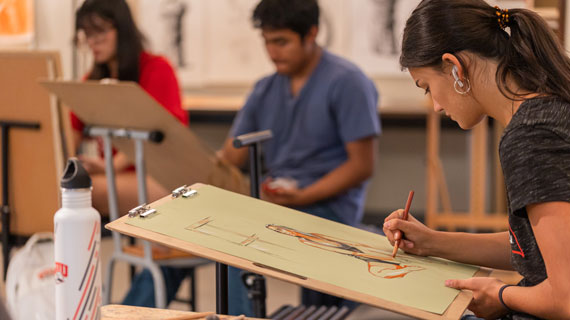Five Reasons Why You Should Take a Career Assessment
Posted: March 23, 2023 | Author: McKinley Hatch | Read Time: 6 minutes
 What if you could have a job that pays the bills AND you enjoy? I’m sure you can!
What if you could have a job that pays the bills AND you enjoy? I’m sure you can!
Southern Utah University’s Career and Professional Development Center offers a resource to students called a career assessment. The career assessment (also known as the Strong Interest Inventory) is designed to help students who need extra help figuring out what they want to study in college, or for students who just need confirmation and validation that they’re on the right track.
The career assessment that SUU offers students is individualized and provides valuable information regarding your interests, learning styles, preferred work environment, and values. By understanding interests and personality, it guides students to career opportunities that are more tailored to their interests and skills.
Five Reasons to Take a Career Assessment
1 - It helps you better understand your interests
Did you know you can actually enjoy your career? Yes, you heard that right — you can enjoy your career! The career assessment helps to determine where your interests and hobbies lie. If you want a job that will satisfy your interests, you may consider taking the assessment.
There are six themes in the assessment that are deeply analyzed. The six themes are artistic, conventional, enterprising, investigative, realistic, and social.
Typically, people with the artistic theme are “the creators” and they are typically interested in self-expression, art, communication and culture. Work activities they may enjoy include composing music, writing, performing, and creating visual art. They often value beauty, originality, independence and imagination.
People who are conventional are “the organizers” and are typically interested in organization, data, management, accounting, investing, and information systems. Work activities they may include might look like setting up procedures and systems, organizing, keeping records and developing computer applications. Conventional people often value accuracy, stability and efficiency.
People who fall under the enterprising category are “the persuaders” and are typically interested in business, politics, leadership and entrepreneurship. They might enjoy selling, managing, persuading, and marketing as work activities. They often value risk-taking, status, competition and influence.
Next, are “the thinkers” which is under the investigative theme. Interests in this category might include science, medicine, mathematics, and research. Work activities they may enjoy might include performing lab work, solving abstract problems, and conducting research. They typically value independence, curiosity, and learning.
Our realistic folks are “the doers” who are typically interested in machines, computer networks, athletics and working outdoors. Work activities they may enjoy include operating equipment, using tools, building, repairing, and providing security. They often value tradition, practicality, and common sense.
The last, but not least, theme is social. “The helpers” are typically interested in people, teamwork, helping, and community service. Some work activities they might enjoy are teaching, caring for people, counseling, and training employees. They often value cooperation, generosity, and service to others.
Do any of these main six themes stand out to you? Take the career assessment to learn more about your top themes that align with your interests.
2 - You can identify careers that match your goals and talents
Now that you understand the six main themes, you can understand how the assessment can show you careers that align with your goals, talents and interests. If you have a natural talent for organization and data management, you might gravitate toward the conventional theme. Based on your top themes, you can then break down specific careers that sound appealing to you.
There may be careers you will find on your results that don’t sound interesting to you at all, and that doesn't mean you have to do that career, nor that it’s the one true career path for you. For example, maybe you see being a bartender as a top job choice for you, but it’s important to understand why that is a top choice. The bartender job is coded as SEA, which stands for social, enterprising, and artistic. It’s coded this way because you get to interact with people, you are selling drinks and giving recommendations, and you are able to be creative with the drinks you make. The jobs that appear on your list may not be of interest to you, but there are aspects of the job that align with your top themes; that’s what is important to grasp as you analyze the assessment.
“When I took the career assessment, I learned that apparently, I could make a good psychologist based on my results; that’s something my friends suggest to me most of the time, although I didn’t think it would be true,” Fanny Felixine, SUU student, said. “If you don’t know what you want to do, take this assessment because in addition to being able to reflect on yourself from the results, it also presents new careers that can surely suit you by doing some research.”
Take the career assessment to see your top careers that match your goals and talents!
3 - It makes you aware of what careers are out there — maybe some you haven’t even considered before
“Something I learned about myself while taking the assessment is that based on my personality, I might be better for a career I never thought about,” Alaric Gray, SUU student, said.
Did you ever think that there are maybe careers out there that you haven’t even considered before? Even careers that you might really enjoy. Taking the career assessment allows you to identify careers that you may have not considered before.
4 - It can provide reassurance that you’re on the right career path
“I took the career assessment two years into my career and it was still useful,” McKinley Hatch, SUU employee, said. “There are days in your career that you wonder if you made the right decision, but taking the assessment was reassuring that I am on the right track. Even when I have doubts about my career, it’s good to know that I enjoy it and that it’s a good fit for me based on my interests and passions.”
Similar to McKinley, you can take the assessment to feel reassured that you made the right decision, or that you’re on the right track. Or, if you are looking for a career change, this test would be perfect for you to learn more about where you might want to land.
“Change is okay; You don’t have to stick to one thing,” Gray said. “You can enjoy a career that you had never thought of. Explore the options!”
5 - It helps you identify your strengths and weaknesses
Lastly, the career assessment can help you identify your strengths and weaknesses. Understanding your personal strengths and weaknesses can transfer into your career. If you know that you are great at working with people, you will want to find a job where you collaborate with others often. Or, if you learn that your leadership style is to sit back and let others lead, you won’t want to aim for a leadership position.
There are so many things you learn about yourself by taking the career assessment.
“It gave me different insight on what I like and what I thought I liked, or what I didn’t even know I liked,” Gray said.
Take the Assessment — Free for Sophomores!
If you find this information useful and you have a desire to learn more about your strengths, interests and career options, schedule a career assessment through the SUU Career Center. The assessment is $15 for SUU students, and it’s free for sophomores (anyone who has completed 30 - 60 credits). If you’re a sophomore and want to take the assessment for free, reach out to the Career Center.
Schedule an appointment to find out more about yourself, your career, and your skills. Good luck finding the right career for you, and let the Career Center know how they can help you in your search!
Tags: Student Career Center



